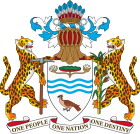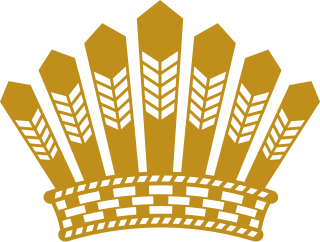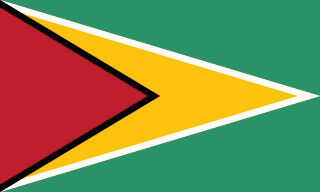 |
|---|
| Constitution |
The National Republican Party (NRP) was a right-wing political party in Guyana.
 |
|---|
| Constitution |
The National Republican Party (NRP) was a right-wing political party in Guyana.
The party was established in 1990 following a split in the United Republican Party. [1] In the 1992 general elections it received just 114 votes and failed to win a seat. [2] The party did not contest any further elections, and merged into the National Front Alliance on 1 December 2000. [3]

The politics of Guyana takes place in a framework of a representative democratic assembly-independent republic, whereby the President of Guyana is the head of government and of a multi-party system. Executive power is exercised by the President, advised by a cabinet. Legislative power is vested in both the President and the National Assembly of Guyana. The judiciary is independent of the executive and the legislature.

The Republican Party is one of the two major contemporary political parties in the United States. It emerged as the main political rival of the Democratic Party in the mid-1850s.

The president of Guyana is the head of state and the head of government of Guyana, as well as the commander-in-chief of the armed forces of the Republic, according to the Constitution of Guyana. The president is also the chancellor of the Orders of Guyana. Concurrent with their constitutional role as Commander-in-Chief of the Armed Forces, the president does not appoint a separate Minister of Defence. That portfolio is held by the president who fulfils all responsibilities designated to a minister of defence under the Defence Act.

The prime minister of the Co-operative Republic of Guyana is an elected member of the National Assembly of Guyana who is the principal assistant and advisor to the president as well as the leader of government business in the Assembly, but is not the head of government in Guyana. The prime minister assumes the office of president if the presidency becomes vacant.

Linden Forbes Sampson Burnham was a Guyanese politician and the leader of the Co-operative Republic of Guyana from 1964 until his death in 1985. He served as Premier of British Guiana from 1964 to 1966, Prime Minister of Guyana from 1964 to 1980 and then as the first Executive President of Guyana from 1980 to 1985. He is often regarded as a strongman who embraced his own version of socialism.

Elections in Guyana take place within the framework of a multi-party representative democracy and a presidential system. The National Assembly is directly elected, with the nominee of the party or alliance that receives the most votes becoming President.

The People's Progressive Party/Civic (PPP/C) is a major political party in Guyana. As of 2020, the party holds 33 of the 65 seats in the National Assembly and forms the government. It has been the ruling party in the past as well, most recently between 1992 and 2015. In Guyana's ethnically divided political landscape, the PPP/C is a multi-ethnic organization that is supported primarily by Indo-Guyanese people.

The National Front Alliance is a political party in Guyana.

The People's National Congress Reform (PNCR) is a social-democratic and democratic socialist political party in Guyana led by Aubrey Norton. The party currently holds 31 of the 65 seats in the National Assembly. In Guyana's ethnically divided political landscape, the PNCR is a multi-ethnic organization.

David Arthur Granger is a Guyanese former politician and retired military officer who served as the ninth president of Guyana from 2015 to 2020. A member of the People’s National Congress (PNC), he previously served as Commander of the Guyana Defence Force and as National Security Adviser from 1990 to 1992. He was leader of the Opposition in the National Assembly of Guyana from 2012 to 2015.

The National Assembly is one of the two components of the Parliament of Guyana. Under Article 51 of the Constitution of Guyana, the Parliament of Guyana consists of the president and the National Assembly. The National Assembly has 65 members elected using the system of proportional representation. Twenty five are elected from the ten geographical constituencies and forty are awarded at the national level on the basis of block votes secured, using the LR-Hare Formula as prescribed by the elections Laws (Amendment) Act 15 of 2000.

The United States House of Representatives elections in California, 1978 was an election for California's delegation to the United States House of Representatives, which occurred as part of the general election of the House of Representatives on November 7, 1978. Republicans knocked off three Democratic incumbents. 11th district Congressman Leo Ryan was re-elected, but was murdered while investigating the Peoples Temple in Guyana following the election.

Guyana, officially the Co-operative Republic of Guyana, is a country on the northern mainland of South America. Guyana is an indigenous word which means "Land of Many Waters". The capital city is Georgetown. Guyana is bordered by the Atlantic Ocean to the north, Brazil to the south and southwest, Venezuela to the west, and Suriname to the east. With a land area of 215,000 km2 (83,000 sq mi), Guyana is the third-smallest sovereign state by area in mainland South America after Uruguay and Suriname, and is the second-least populous sovereign state in South America after Suriname; it is also one of the least densely populated countries on Earth. It has a wide variety of natural habitats and very high biodiversity.

A Partnership for National Unity (APNU) is a political alliance in Guyana.

The United Republican Party (URP) is a political party in Guyana.

Snap general elections were held in Guyana on 2 March 2020. They were called early after the government of President David A. Granger lost a vote of no confidence by a margin of 33–32 on 21 December 2018, the government having held a one-seat majority since the 2015 elections. However, one of its own MPs, Charrandas Persaud of the Alliance for Change (AFC), voted with the opposition. Granger announced on 25 September 2019 that the elections would be held on 2 March 2020.

Mohamed Irfaan Ali is a Guyanese politician serving as the tenth and current president of Guyana since 2020. A member of the People’s Progressive Party/Civic (PPP/C), he previously served as the minister of Housing and Water from 2009 to 2015. He is the first Muslim to hold office, and is the second Muslim head of state in the Americas after Noor Hassanali of Trinidad and Tobago.
Double simultaneous vote (DSV) is an electoral system in which multiple offices – such as the president and members of a legislature – are elected through a single vote cast for a party. It can be combined with other electoral systems; in Uruguay DSV is used to elect the president and members of the Senate and Chamber of Representatives, with the presidential election also using the two-round system; if no party/presidential candidate receives a majority of the vote, a second round is held for the presidential election.